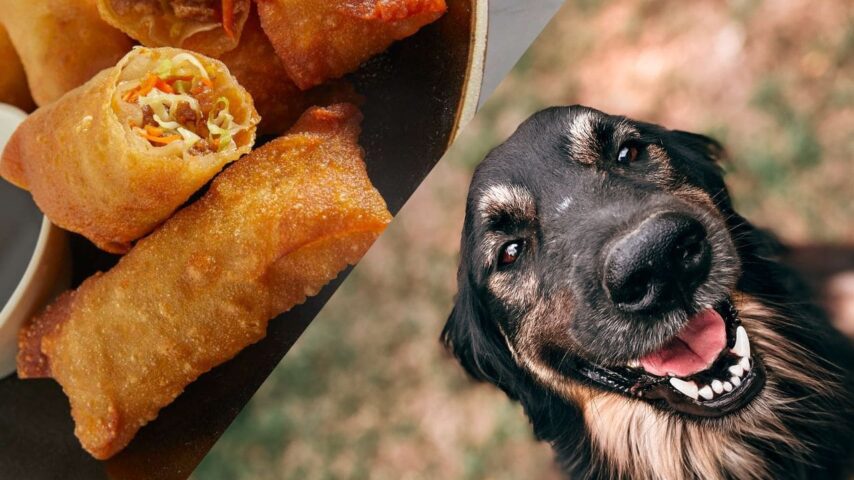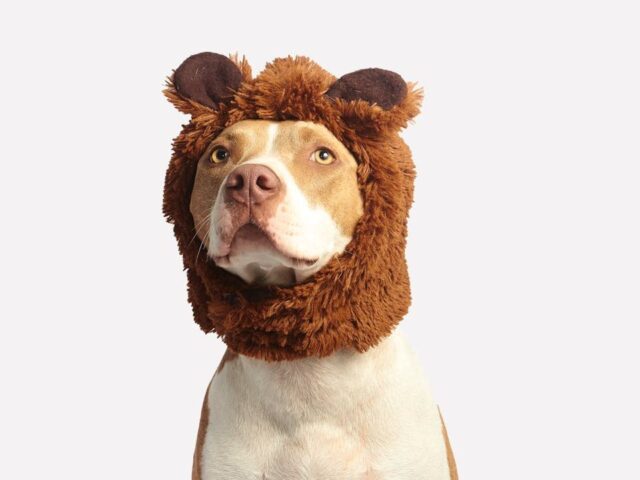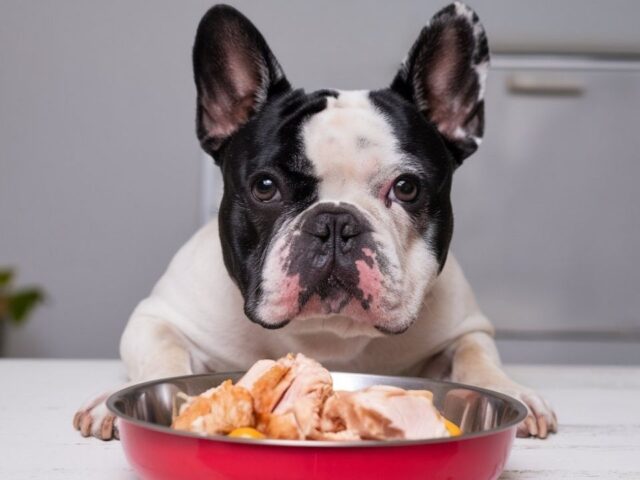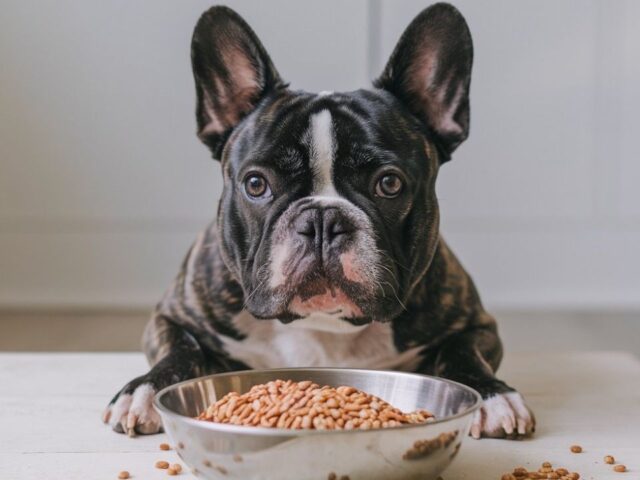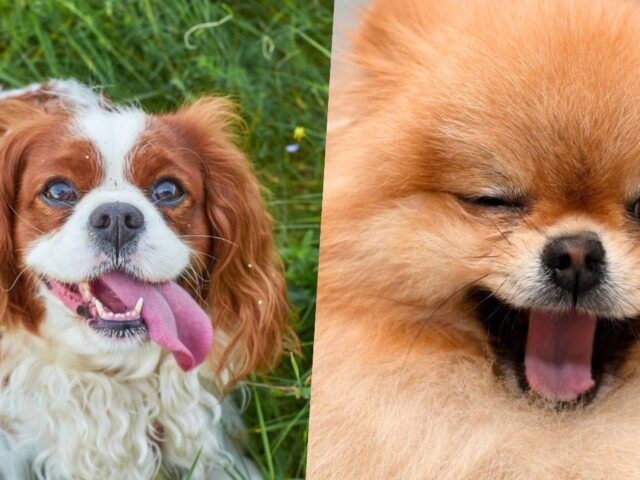As dog lovers, we often wonder if our furry friends can safely enjoy the same foods we do. But have you ever questioned whether dogs can eat egg rolls?
In this comprehensive guide, we’ll explore the ingredients found in egg rolls, their potential health risks and benefits for dogs, and what to do if your pup accidentally snags one off your plate.
The answer to the question that whether dogs can eat egg rolls is “NO” due to the potential health risks associated with their ingredients and high carb and fat content. Egg rolls contain onions, garlic, and other seasonings that are harmful for dogs.
Table of Contents
- 1. Key Takeaways
- 2. Understanding The Ingredients Of Egg Rolls
- 3. Can Dogs Safely Eat Egg Rolls?
- 3.1 Risks And Potential Health Issues
- 3.2 Pet-Safe Ingredients In Egg Rolls (lean Meats, Vegetables Without Seasonings, Rice Paper Wrappers)
- 4. What To Do If Your Dog Eats An Egg Roll
- 5. Safe And Healthy Treats For Dogs
- 5.1 Homemade Treat Recipes
- 5.2 Alternative Treats For Dogs
- 5.3 Benefits Of Incorporating Healthy Treats
- 6. Final Thoughts on Can Dogs Eat Egg Rolls
- 7. FAQs on Can Dogs Eat Egg Rolls
Key Takeaways
- Egg rolls contain harmful ingredients for dogs such as onions, garlic, and seasonings.
- The high carb and fat content in egg rolls can lead to weight gain and digestive issues.
- Dogs should not be fed egg rolls but can enjoy homemade treats with safe ingredients like lean meats and vegetables.
- If your dog accidentally eats an egg roll, monitor them for symptoms of discomfort or illness and contact your veterinarian if necessary.
Understanding The Ingredients Of Egg Rolls
Egg rolls are made up of multiple ingredients, some of which can be harmful to dogs.
Harmful Ingredients For Dogs (onions, Garlic, Seasonings)
Feeding dogs human food might seem harmless, but it’s important to remember that some ingredients can be harmful or even dangerous to their health. Here is a list of some of the harmful ingredients commonly found in egg rolls:
- Onions – Even small amounts of onions can cause serious health issues for dogs, such as anemia and damage to red blood cells.
- Garlic – Similar to onions, garlic is toxic to dogs and can lead to gastrointestinal upset, anemia, and other complications.
- Seasonings – Many spices used in egg rolls, such as salt, pepper, and monosodium glutamate (MSG), may cause stomach irritation and electrolyte imbalances.
- High Carb Content – Egg rolls are typically high in carbohydrates from the wrappers and fillings, which can lead to weight gain and obesity-related problems in dogs.
- High Fat Content – The deep – fried nature of egg rolls means they are rich in unhealthy fats that can contribute to weight gain and digestive issues in dogs.
As a responsible dog owner, it’s essential to be aware of the potential risks associated with feeding your dog human foods containing these harmful ingredients. Stick to pet-friendly meals or treats specifically formulated for dogs’ unique dietary needs to ensure their optimal health and well-being.
High Carb And Fat Content
Egg rolls are notoriously high in carbohydrates and fat, which can be harmful to a dog’s health. While carbs play an important role in a dog’s diet by providing energy, too much of them can lead to weight gain and even obesity.
Additionally, the high-fat content in egg rolls can cause digestive issues and even pancreatitis if consumed regularly. Dogs require healthy fats for proper brain function, skin health, and other vital bodily functions, but it is essential to monitor their intake carefully.
Can Dogs Safely Eat Egg Rolls?
While it is not recommended to feed your dog egg rolls, this section explores the risks and pet-safe ingredients in egg rolls that can help you make an informed decision about what to feed your furry friend.
Risks And Potential Health Issues
Egg rolls may be a popular food for humans, but they can pose serious risks to our furry friends. Many ingredients used in egg rolls, such as onions, garlic powder, and seasonings contain compounds that are toxic to dogs.
In addition to harmful ingredients, the high carb and fat content of egg rolls is not suitable for most dogs’ diets. While carbohydrates are essential for providing energy to dogs, too many carbs in their diet can lead to weight gain and other health problems.
It’s essential always to monitor what foods your dog ingests carefully.
Pet-Safe Ingredients In Egg Rolls (lean Meats, Vegetables Without Seasonings, Rice Paper Wrappers)
Egg rolls are not recommended for dogs, as they contain harmful ingredients like garlic and onion powder. However, if you want to make an egg roll for your furry friend, here are some pet-safe ingredients you can include:
- Lean meat: You can use cooked chicken or turkey as a lean protein source in your dog’s egg roll. Make sure to remove any bones and excess fat before feeding it to them.
- Vegetables without seasonings: Dogs can enjoy a variety of vegetables such as carrots, broccoli, and green beans. Just make sure that they are not seasoned with anything that could be harmful to their health.
- Rice paper wrappers: Instead of the traditional wheat flour wrappers, use rice paper wrappers to make the egg roll. They are easier to digest and provide less carbohydrates than regular wrappers.
Remember that while these ingredients may be safe for dogs in moderation, it’s always best to consult with your veterinarian before introducing new foods into their diet.
What To Do If Your Dog Eats An Egg Roll
If your dog eats an egg roll, monitor them for any symptoms of discomfort or illness such as vomiting, diarrhoea, or lethargy.
Monitor For Symptoms
If you suspect that your dog has accidentally ingested an egg roll, it is important to keep a close eye on them for any signs of discomfort or illness. Some common symptoms that may arise after consuming harmful ingredients include vomiting, diarrhoea, lethargy, and loss of appetite.
In some cases, the symptoms may not appear immediately and could take several hours before developing. Therefore, it is crucial to monitor your dog closely even if they seem fine initially.
If your dog does show any signs of distress or unusual behavior following the consumption of an egg roll, contact your veterinarian immediately for further advice on what steps to take next.
Contact Your Veterinarian
If your dog accidentally consumes an egg roll, it is crucial to contact your veterinarian immediately. They can provide you with the best advice on what steps to take next and how to help alleviate any discomfort or symptoms that your dog may be experiencing.
Symptoms of discomfort in dogs might include vomiting, diarrhoea, lethargy, loss of appetite, and dehydration. Your veterinarian will also advise on the correct amount of bland diet meals for your furry friend and give recommendations for safe foods and treats that will not harm their health.
Provide A Bland Diet
If your dog has consumed an egg roll and is experiencing discomfort or digestive issues, it may be necessary to provide them with a bland diet. A bland diet for dogs typically includes foods that are easy on their stomachs and low in fat and spices.
It’s important to note that while a bland diet can help soothe upset stomachs, it should only be fed temporarily. If your dog’s symptoms persist or worsen despite the introduction of a bland diet, it may be necessary to seek veterinary attention.
Safe And Healthy Treats For Dogs
Incorporating healthy treats into your dog’s diet, like lean meats and vegetables, can provide them with the nutrients they need to maintain good health.
Homemade Treat Recipes
Making homemade treats for your furry friend can be a fun and healthy way to show them some love. Here are some easy recipes that you can try:
- Peanut Butter Banana Bites: Mix together one ripe banana, 1/3 cup of creamy peanut butter, and half a cup of rolled oats. Form into small balls and bake in the oven at 350°F for 10-12 minutes.
- Sweet Potato Chews: Slice sweet potatoes into thin strips and bake in the oven at 250°F for about three hours or until they’re dry and crispy.
- Meaty Treats: Cook up some lean ground beef or chicken (make sure it’s thoroughly cooked!) and mix with cooked brown rice, pureed pumpkin, and a bit of parsley for fresh breath. Roll into small balls and refrigerate.
- Apple Carrot Biscuits: Combine grated apple, grated carrot, oat flour, cinnamon, and an egg to make a dough. Roll out on a floured surface and cut into shapes with cookie cutters. Bake at 350°F for about 20-25 minutes or until golden brown.
- Frozen Yogurt Popsicles: Mix plain yogurt with some mashed berries, pour into popsicle molds (or ice cube trays if you don’t have molds), and freeze overnight.
These homemade treats are packed with natural ingredients like fruits, vegetables, and lean meats that are good for your dog’s health. Plus, making them yourself means you can control what goes into them to avoid harmful additives or preservatives found in store-bought treats.
Remember to always consult your veterinarian to ensure that any new food introduced to your dog is safe for their specific dietary needs!
Alternative Treats For Dogs
Are you looking for some alternative treats to feed your furry friend instead of egg rolls? Here are some options that can be both healthy and satisfying:
- Fresh Fruits: Many dogs love fruits such as apples, bananas, blueberries, and strawberries. These are great sources of fiber, vitamins, and antioxidants.
- Vegetables: Carrots, green beans, cucumber slices, and sweet potato chunks are excellent low-calorie treats for dogs. They are also loaded with essential nutrients like vitamin A and potassium.
- Meat Treats: Lean meats like chicken or turkey cooked without any seasoning can make a tasty protein-rich snack for dogs.
- Peanut Butter: Most dogs enjoy peanut butter, which is an excellent source of protein and healthy fats. Just make sure to choose a brand that does not contain xylitol, a sweetener that can be toxic to dogs.
- Frozen Treats: You can freeze unsweetened yogurt or pureed pumpkin in ice cube trays to create delicious frozen treats for your dog.
Remember that treats should only make up about 10% of your dog’s daily diet. So always keep the portions small and avoid overfeeding them with human food.
Benefits Of Incorporating Healthy Treats
Incorporating healthy treats into your dog’s diet can have numerous benefits for their overall health and well-being. By offering a variety of nutritious options, you can ensure that your furry companion is receiving the necessary vitamins and minerals to maintain a healthy lifestyle.
Healthy treat options for dogs include fresh fruits and vegetables such as carrots, green beans, and sweet potatoes. Lean proteins like chicken or turkey can also be incorporated into homemade dog treats.
These types of treats not only provide essential nutrients but also offer a low-calorie alternative to traditional store-bought options that often contain high levels of fat and preservatives.
Final Thoughts on Can Dogs Eat Egg Rolls
In conclusion, egg rolls are not recommended for dogs to eat due to the potential health risks associated with their ingredients and high carb and fat content.
While some ingredients like lean meats and rice paper may be safe for dogs, it’s best to stick to pet-specific food options. If your dog accidentally eats an egg roll, monitor them closely and contact your veterinarian if necessary.
Remember, keeping our furry friends healthy starts with understanding what foods are safe for them to consume. Incorporating healthy treats into their diet can also provide a much-needed boost of nutrients while satisfying their taste buds.
FAQs on Can Dogs Eat Egg Rolls
It is not recommended for dogs to eat egg rolls due to their high fat and sodium content, as well as the potential presence of harmful ingredients like onions and garlic.
If your dog accidentally consumes an egg roll, monitor them closely for signs of discomfort or illness such as vomiting, diarrhea, or loss of appetite. Contact your veterinarian immediately if any symptoms occur.
It is not advisable to modify traditional egg roll recipes in order to make them safe for dogs as many ingredients commonly used in these dishes can be harmful or toxic to pets. Instead, opt for commercially made pet food specially formulated with all the necessary nutrients that your furry friend requires.
Yes! Some human foods that are okay in moderation include lean meats (cooked), eggs (also cooked), certain fruits (e.g., blueberries), and vegetables (green beans). However, it’s always a good idea confirm with a veterinary professional before introducing any new food item into your pet’s diet – even if they seem healthy at first glance!
Read More Interesting Articles on Dogs:
- Can Dogs Eat Farro? Exploring the Benefits and Risks
- Can Dogs Safely Eat Corn? Expert’s Guide to Feeding Corn To Your Dog
- Do Dogs Really Have Uvulas? Everything You Need to Know
- Can Dogs Get Acne and How to Cure It!
- Can Dogs Eat Croutons? Must Read Before Feeding Your Dog Croutons
- Can Dogs Eat Falafel? Everything You Need to Know
- Can Dogs Eat Bread? Health Facts and Safety Guide

